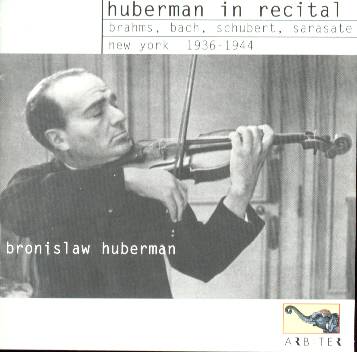For so elite – if controversial – a musician Huberman’s
recordings are relatively sparse. Arbiter has therefore put us in their
debt by releasing a disc that expands his discography by including the
Brahms sonata in G – he’d famously played the Concerto as a boy in the
presence of the composer - and the Schubert Fantasie. And some idea
of his overwhelmingly involving Bach can be gauged from the Partita
in D minor which has survived albeit in less than perfect sound. We
should be grateful for the unsparing efforts of Seth Winner who worked
on the glass-based acetates, subsequently copied onto tape. The Bach
was made on a lacquer.
Huberman was one of the most individual of violinists
and one who still divides critical opinion. His Brahms (New York, April
1943) is an immensely generous performance but as ever critical debate
will turn to his tonal qualities. I find myself swept up by Huberman
even as I register doubt and objections. So for example his tone sounds
thin, and frequently very dry, the vibrato unwarmed, his portamenti
in the opening movement excessive and exaggerated in the interests of
maximal emotive impression. The dynamics are in a constant, vastly entertaining
and meaningful sense of flux – whether they are convincing is another
matter - and he does once or twice attack from under the note. There
are some minor technical problems but in the main his left hand is under
firm control. What will take a deal of getting used to (for those unfamiliar
with Huberman) is the problematical and anachronistically employed vibrato
usage – and the expressive whitening, a sudden bleaching, of tone in
which he engages. For all that this is decidedly not my idea of a forward
looking twentieth century violinist I cannot help but admit that the
latent power and seriousness of his conception has powerful attractions.
And his diminuendo on the last phrase of the first movement is striking
indeed. In the second movement he manages to etch deep meaning from
within the text – the means, tonal and otherwise by which he does so
are problematical but somewhat beside the point – as he develops an
unstoppable, almost oratorical grandeur. At moments like this one can
understand the near adulatory appeal of Huberman in central Europe (where
he was especially admired). There is a fusion of transcendence and philosophic
seriousness difficult to resist. It’s true that his tone remains unwarmed
and where vibrato is applied it is not uniform and continuous (though
Huberman was a near contemporary of Kreisler he never really absorbed
Kreisler’s modernising trends in that respect). Nevertheless Boris Roubakine
plays with witty charm and Huberman’s phrasal elasticity generates an
undeniable nobility and grandeur of expression. It should be noted that
there is a little damage on the acetates from about 5.20 onwards, some
pitch fluctuation as well but it’s temporary and has been limited.
The Bach Partita is an especially valuable survival,
dating from December 1942. He’d recorded the Concertos in A and in E
with the Vienna Philharmonic and Dobrowen on a single day in 1934 and
had recorded a few isolated movements from the Sonatas and Partitas
but this Partita (with the Chaconne) - although it’s made a commercial
appearance before - is intensely interesting. The sound is poorer than
the Brahms and there are some swishes but we can still hear a great
deal and listen through the impediments to the heart of Huberman’s performance.
His vibrato in the Courante is slow and very wide and especially employed
as a climactic expressive device, and at paragraphal or phrase endings
- rather like a monumental full stop. But there is wonderful clarity
of voicings and he opens the Sarabande in powerfully dramatic fashion,
taking the movement by the scruff of its neck; notes positively leap
from the grooves. As for the Chaconne it is once more a question of
greater architectural and emotive issues taking precedence over niceties
of bowing or vibrato usage. Those who think that, in William Primrose’s
words, Huberman "scratches abominably" will find ample documentary
evidence to support the charge. Those, equally, who revere his magnetic
drive, will use these performances as evidence for the defence, should
such be necessary.
In the extremely difficult Schubert Fantasie – a graveyard
for the unwary duo – his and Roubakine’s sagacity is fully developed.
Whilst I admired the contours of the performance and the exceptional
control exercised by both men there were times when I wasn’t able, fully,
to reconcile romantic impress with the dictates of the structure. The
on/off vibrato usage and the occasionally desiccated tone – this performance
dates from a concert in January 1944 – are not ultimately to the work’s
advantage. Sarasate’s Romanza Andaluza is a part of his accepted
commercial discography (he recorded it twice, in 1924 acoustically and
again in 1930, both times with Siegfried Schulze) and here the pianist
is unidentified (though it might be Schulze). It’s the earliest item
here by far, recorded in April 1936, but in good sound. This heats up
very nicely indeed and is on balance the best of the now extant recordings.
The endemically slow and wide vibrato is no hindrance here to some marvellous
theatricality and panache.
This is a release of striking importance to those interested
in the development of violin playing in the twentieth century. The good
notes are by Allan Evans who cites revealing comments made by Felix
Galimir; the transfers are surely of pretty optimum quality. Striking
then and exciting too, revealing an indelible talent whose live performances
take on renewed almost miraculous life here.
Jonathan Woolf
